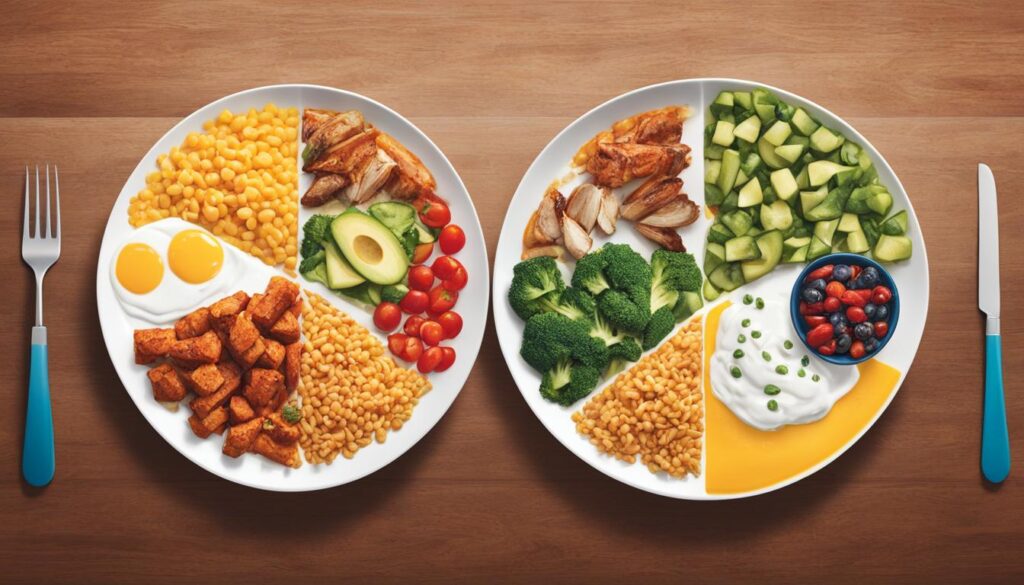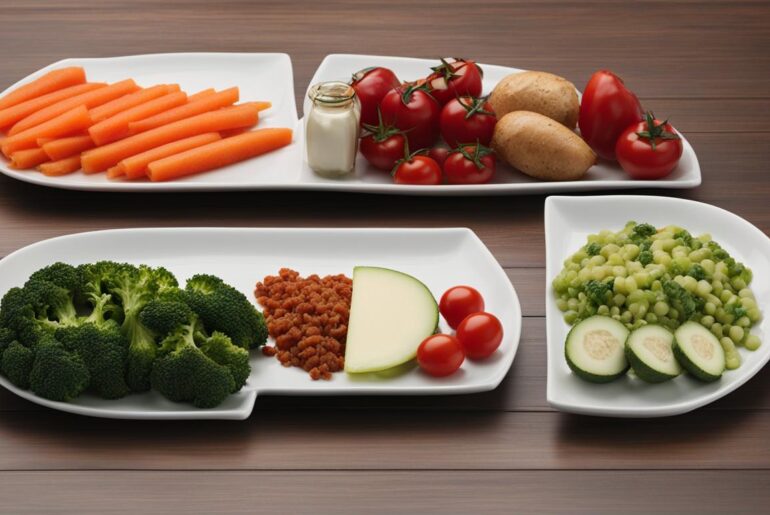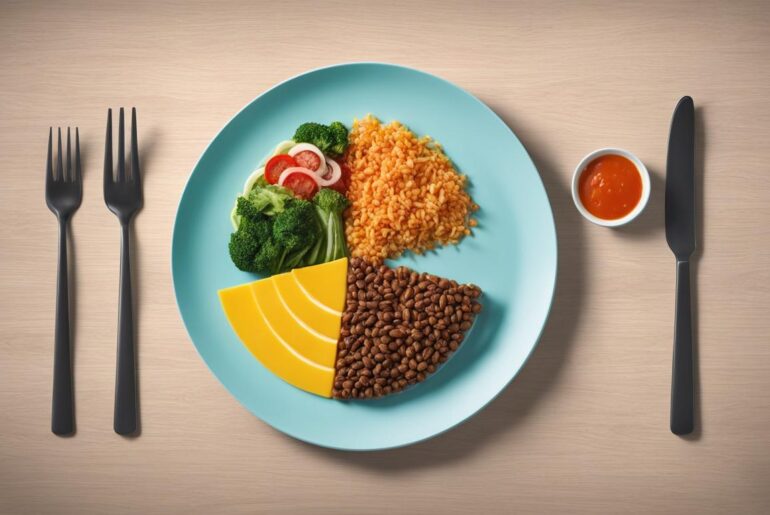When it comes to maintaining a healthy diet, portion control can be a valuable tool. However, it is essential to understand the advantages and disadvantages of this approach in order to make informed decisions about our eating habits.
Portion control offers several benefits. By managing our food portions, we can prevent overeating and ensure a balanced intake of nutrients. This can help with weight management and prevent excessive weight gain, promoting overall well-being. Additionally, portion control promotes mindful eating, allowing us to be more in tune with our hunger and fullness cues. By being aware of appropriate portion sizes, we can develop healthier eating habits and improve our overall diet quality.
On the other hand, there are also some drawbacks to consider. Strict portion control may lead to feelings of deprivation and limited food choices, potentially impacting our relationship with food. It can also be time-consuming and require constant vigilance in measuring and tracking our food intake. Furthermore, overly strict portion control may not take into account our individual nutritional needs and preferences, possibly leading to imbalances in our diet.
Despite these drawbacks, the impact of portion control on energy intake is well-documented. Larger portion sizes have been shown to increase energy intake, leading to weight gain and a higher risk of obesity. Conversely, practicing portion control can help us reduce our energy intake, leading to weight loss or weight maintenance. Striking a balance that allows for adequate nutrition while managing portion sizes is crucial for achieving a healthy energy balance (see my post here).
To effectively practice portion control, there are several strategies we can employ. Using smaller plates and bowls can create the illusion of larger portions while actually consuming less food. Measuring and weighing our food servings can help us become more aware of appropriate portion sizes. Planning and prepping meals in advance can also assist in controlling portion sizes. Additionally, paying attention to our hunger and fullness cues can help us determine suitable portion sizes for our individual needs.
Key Takeaways:
- Portion control can aid in weight management and promote mindful eating.
- Strict portion control may lead to feelings of deprivation and limited food choices.
- Larger portion sizes can increase energy intake, while portion control can help reduce it.
- Strategies like using smaller plates, measuring food servings, and paying attention to hunger cues can assist in practicing portion control.
- It is important to find a balance that considers individual nutritional needs and preferences when practicing portion control.
Advantages of Portion Control
Portion control offers numerous benefits for maintaining a healthy diet and achieving weight management goals. By controlling food portions, individuals can enjoy a balanced intake of nutrients while preventing overeating and unnecessary weight gain. Let’s explore the advantages of portion control in more detail:
1. Efficient Calorie Regulation
Controlling portion sizes allows individuals to better regulate their calorie intake. By consuming appropriate portions, you can avoid excess calories that may contribute to weight gain. This not only supports weight management efforts but also promotes overall health and well-being.
2. Mindful Eating
Portion control promotes mindful eating, which involves paying close attention to hunger and fullness cues. By being more aware of your body’s signals, portion control helps you make conscious food choices and prevents mindless snacking. This can lead to a more satisfying eating experience and improved digestion.
3. Building Healthy Habits
Practicing portion control can help you develop and maintain healthy eating habits (check this post out). By consistently consuming appropriate portions, you train your body to recognize and respond to its nutritional needs. This can contribute to a more balanced and nutritious diet, which ultimately supports your long-term health goals.
Overall, portion control offers a range of advantages, including efficient calorie regulation, mindful eating, and the development of healthy eating habits. By implementing portion control strategies, you can take control of your diet, support weight management efforts, and improve your overall health (see my post here).
Disadvantages of Portion Control
While portion control has its benefits, it is important to acknowledge the potential drawbacks and negative effects it may have on individuals. Strict portion control can lead to feelings of deprivation and restricted food choices, which may result in the development of an unhealthy relationship with food. This can lead to emotional eating patterns and harmful behaviors such as binging or yo-yo dieting.
Monitoring food intake through portion control can also be time-consuming and demanding. Constantly measuring and tracking food portions requires a significant amount of dedication and can be seen as a chore for many individuals. This can be particularly challenging for those with busy lifestyles or limited time for meal preparation. The pressure to constantly monitor food can eventually lead to fatigue and stress, potentially negatively impacting the overall well-being and mental health of individuals.
Moreover, overly strict portion control may not take into account individual nutritional needs and personal preferences. Each person has unique dietary requirements and taste preferences, and rigid portion control may fail to provide the necessary variety and balance in the diet. This can result in nutrient deficiencies or imbalances, which are undesirable for maintaining optimal health.
“Strict portion control can lead to feelings of deprivation and restricted food choices, potentially causing individuals to develop an unhealthy relationship with food.”
To summarize, while portion control can be a useful tool in managing weight and promoting healthier eating habits, it is important to approach it with caution and flexibility. Finding a balance between portion control and mindful indulgence is crucial for a sustainable and enjoyable approach to eating.
Disadvantages of Portion Control
| Disadvantages | Description |
|---|---|
| Feelings of deprivation | Strict portion control may lead to feelings of deprivation and restriction, potentially causing an unhealthy relationship with food. |
| Time-consuming | Constant measuring and tracking of food portions can be time-consuming, especially for individuals with busy schedules. |
| Lack of flexibility | Rigid portion control may not account for individual nutritional needs and personal preferences, resulting in imbalances or deficiencies in the diet. |
Impact of Portion Control on Energy Intake

The impact of portion control on energy intake is well-documented. Research has shown that larger portion sizes can have a significant impact on our overall calorie consumption, leading to weight gain and an increased risk of obesity. When we consume larger portions, we tend to underestimate the amount of food we are actually eating, which can contribute to excess energy intake.
On the other hand, practicing portion control can have positive effects on energy intake. By being mindful of portion sizes and reducing the amount of food we consume, we can effectively manage our calorie intake and create a calorie deficit. This can lead to weight loss or weight maintenance, depending on our goals and overall energy balance.
“When it comes to weight management, portion control is an essential tool. It allows us to keep our energy intake in check and make better choices about what we eat.”
It is important to note that portion control should be approached with balance and moderation. Overly strict portion control can lead to feelings of deprivation, which may eventually result in binge eating or an unhealthy relationship with food. It is crucial to find a sustainable approach that allows for both adequate nutrition and portion management.
By implementing portion control strategies, such as using smaller plates, measuring food servings, and paying attention to hunger and fullness cues, we can effectively manage our energy intake and promote a healthier relationship with food.
Benefits of Portion Control on Energy Intake
There are several key benefits of practicing portion control on energy intake:
- Prevents overeating: By controlling portion sizes, we can avoid consuming excessive calories and prevent weight gain.
- Promotes mindful eating: Portion control encourages us to be more conscious of our food choices and eating habits, leading to increased awareness of hunger and fullness cues.
- Improves weight management: By reducing energy intake through portion control, we can achieve weight loss or maintain a healthy weight.
- Promotes healthier food choices: Portion control encourages us to focus on nutrient-dense foods and incorporate a balanced diet.
Negative Effects of Portion Control on Energy Intake
While portion control can have positive effects on energy intake, it is important to consider potential drawbacks:
- Feelings of deprivation: Strict portion control may lead to feelings of deprivation and restricted food choices, which can negatively impact our mental and emotional well-being.
- Limited food variety: Practicing portion control may limit our food choices, potentially leading to monotony in our diet.
- Potential nutrient deficiencies: Overly strict portion control without proper nutritional guidance may result in inadequate intake of essential vitamins and minerals.
Overall, portion control can have a significant impact on our energy intake and weight management. By finding a balance that allows for adequate nutrition while managing portion sizes, we can achieve a healthier energy balance and improve our overall well-being.
Strategies for Effective Portion Control
When it comes to practicing portion control, there are several strategies that can be employed to ensure success. By implementing these tips and techniques, individuals can effectively manage their food intake and promote a healthy eating lifestyle.
1. Use Smaller Plates and Bowls
One effective strategy for portion control is to use smaller plates and bowls. These visual cues can create the perception of larger portions while actually reducing the amount of food consumed. By choosing smaller dishware, individuals can better control their serving sizes and prevent overeating.
2. Measure and Weigh Food Servings
Another helpful technique is to measure and weigh food servings. This allows individuals to become more aware of appropriate portion sizes and avoid consuming excessive amounts. By using measuring cups, kitchen scales, or portion control plates, individuals can accurately determine the right amount of each food group to include in their meals (check out my post on portion control plates here).
3. Plan and Prep Meals in Advance
Planning and prepping meals in advance can also contribute to effective portion control. By preparing meals ahead of time, individuals can portion out their food into appropriate serving sizes before they start eating. This eliminates the temptation to go back for seconds or consume larger portions than necessary.
4. Pay Attention to Hunger and Fullness Cues
Listening to hunger and fullness cues is essential for practicing portion control. It is important to eat when genuinely hungry and stop eating when feeling comfortably full. By slowing down and being mindful of these cues, individuals can avoid overeating and maintain a balanced approach to their meals.
By implementing these strategies, individuals can develop effective portion control methods that work for their lifestyle and goals (see my post here). Whether it’s using smaller dishware, measuring food servings, or planning meals in advance, these techniques can make a significant difference in managing food intake and promoting a healthy diet.
| Benefits of Effective Portion Control | Methods |
|---|---|
| Weight management | Using smaller plates and bowls |
| Mindful eating | Measuring and weighing food servings |
| Improved diet quality | Planning and prepping meals in advance |
| Avoiding overeating | Paying attention to hunger and fullness cues |
Conclusion
In conclusion, portion control is a valuable tool for maintaining a healthy diet and managing weight. It offers several advantages, such as aiding in weight management, promoting mindful eating, and improving overall diet quality. Portion control helps individuals regulate their calorie intake and prevent overeating, leading to better weight control and reduced risk of obesity.
However, it is important to acknowledge the potential drawbacks of portion control, such as feelings of deprivation and restricted food choices. Strict portion control may not be sustainable in the long term and can create an unhealthy relationship with food. It is essential to find a balance that considers individual nutritional needs, preferences, and lifestyle.
By practicing portion control in a mindful and sustainable way, individuals can achieve a healthy and balanced approach to eating. This involves understanding appropriate portion sizes, using strategies like smaller plates and measuring servings, and paying attention to hunger and fullness cues. By taking a personalized approach to portion control, individuals can harness its benefits while avoiding its potential pitfalls, leading to improved well-being and long-term success in maintaining a healthy lifestyle.




